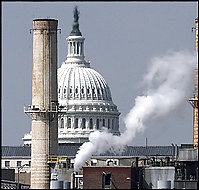The High Cost of Emissions Reduction Symbolism
May 1st, 2008Posted by: Roger Pielke, Jr.

The U.S. Congress has its own power plant which provides steam and cooled water to the various congressional buildings. This plant is powered powered by coal, which makes it a large obstacle in Speaker Nancy Pelosi’s (D-CA) goal of making the Congress carbon neutral. Thus, the power plant has been the subject of some political wrangling that has members of Congress from coal-producing states against those looking to avoid the hypocrisy of Congress calling for emissions limits while operating its own business in a carbon intensive manner.
Today the GAO released a report (PDF) on the costs associated with switching the plant from coal to natural gas. At first glance the costs are not terribly large — in 2009, the costs would be from $1.0 to $1.8 million, with the difference largely due to uncertainties in the costs of natural gas. GAO estimates that the switch would save 9,970 tons of carbon dioxide emissions from the case of no switch.
This equates to $370 to $650 per ton of carbon. This is far higher than the costs of carbon being considered in legislation, found in the market of in the ETS, an in the realm of the costs of simple air capture (PDF).
Now there is surely a lesson here, beyond the fact that members of Congress are willing to pay above market prices for policy outcomes. At these costs, the act of fuel switching at the Capitol power plant would clearly be only of symbolic value, but if emissions reductions can indeed be archived at a low cost, why would the Congress be paying up to $650 per ton of carbon? This doesn’t seem like the right message to be sending to the American public, and could potentially backfire.
May 1st, 2008 at 5:30 pm
Yet another argument for a uniform CO2eq price throughout the economy.
I notice that they assume equal coal and gas boiler efficiency (should be untrue) and omit costs of fuel handling and air quality benefits, all of which might favor the switch. Still, the cost is unlikely to fall far enough to make sense.
If they insist on symbolism, they should start cogenerating electricity and work on total system efficiency.
May 2nd, 2008 at 1:19 pm
The obvious is being missed here: Congress is not sensitive to costs. The marketplace has no influence on Congress. What Congress wants, it mandates. If it wants a symbolic gesture for a flawed purpose, cost is irrelevant.